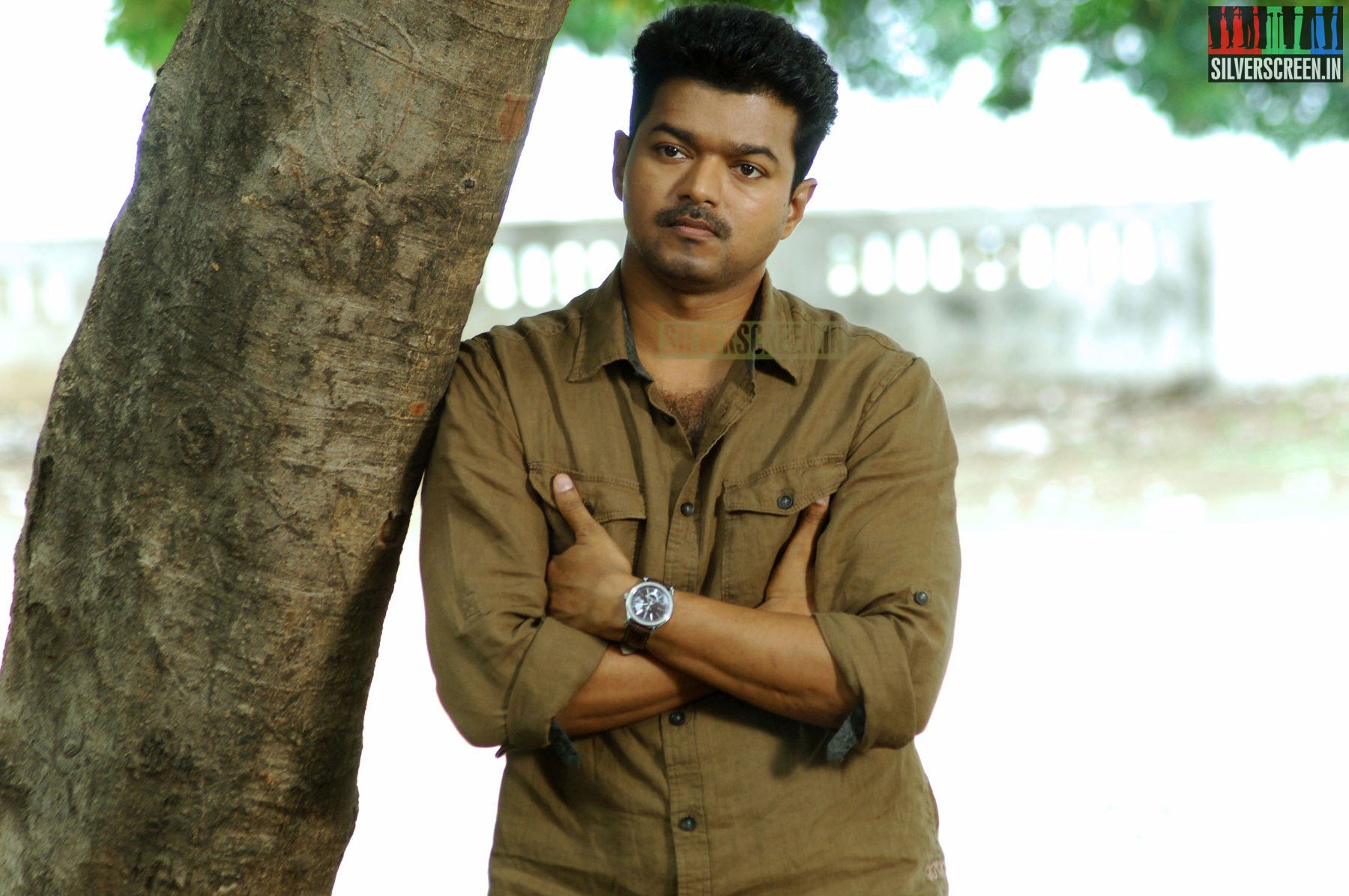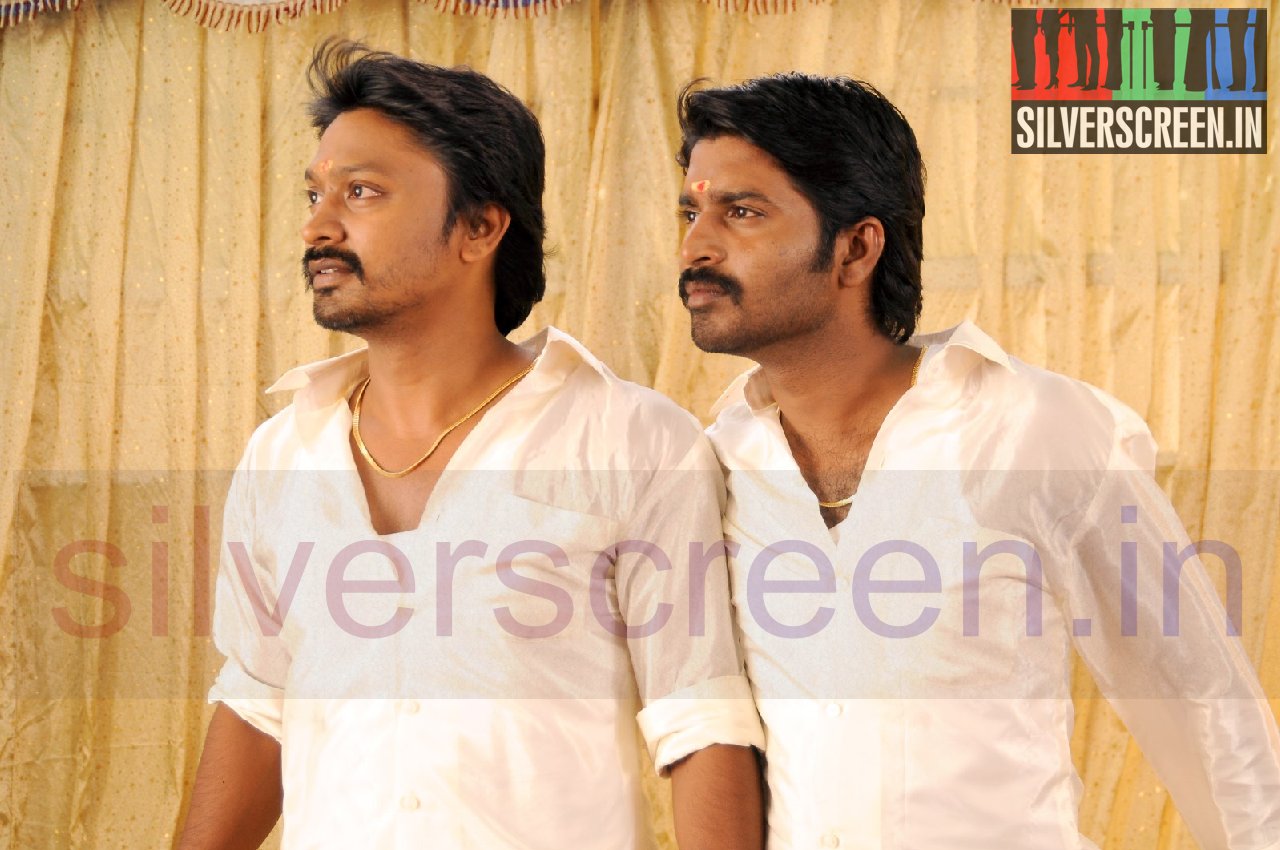Parthiban settles down readily for a telephonic interview when I call him, but when I finish making introductions, he can contain himself no longer. Ungalukku Tamizh theriyadha? He suddenly bursts forth (my Tamil is quite broken, yes).
It takes a couple of minutes to reassure him that I do know the language.
A brief pause. Then, a grunt.
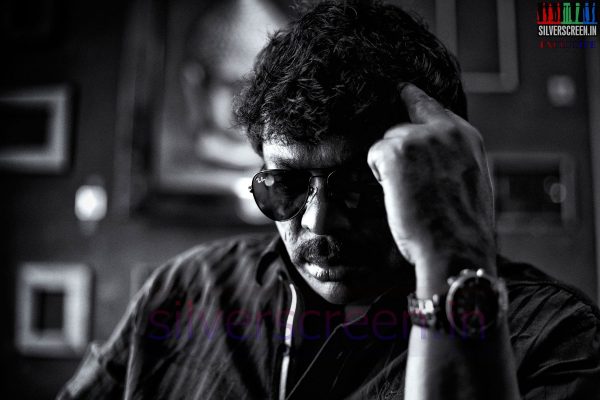
Actor Director R Parthiepan Exclusive HQ Photoshoot Stills for Silverscreen.in
“How much longer do you need?”
“45 minutes?”
He has a better idea. “Why don’t we meet tomorrow? At my office?”
It would be less tedious, he says.
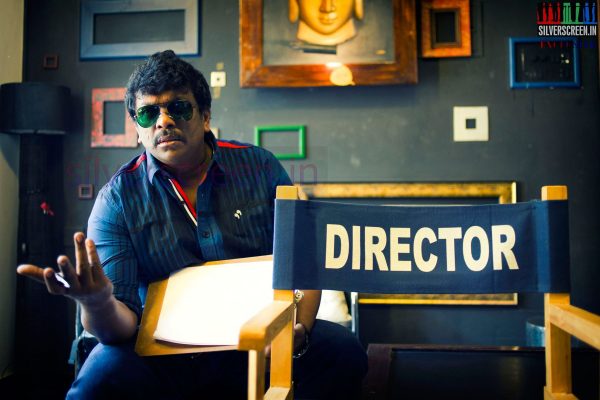
Actor Director R Parthiepan Exclusive HQ Photoshoot Stills for Silverscreen.in
Black-tinted walls are lined with unfilled, thick-rimmed photo frames, and a sublime Buddha-bust commands pride of place. A director’s chair squats right in the middle of this tetragonal room. Clearly, he never occupies it.
[quote align=’right’]This is my 25th year and that movie (Puthiya Paadhai) still remains a trend-setter. Take Sathuranga Vettai or Paruthiveeran, they are all inspired from my work.[/quote]Parthiban’s morning appears to have just begun. He’s still tousle-haired, and the powder-white embroidered shirt seems lived-in. A large mug of freshly-brewed tea sits on the table. He signals for more tea, and his man Friday fetches a tray laden with cups.
“Shall we finish the photo-shoot, then?” I venture.
He grunts again.
In dissent, this time, though. He isn’t ready now. “You should have told me,” he chides gently. “I wasn’t aware of the shoot.”
I dart an apologetic glance at our photographer, and switch on the recorder.
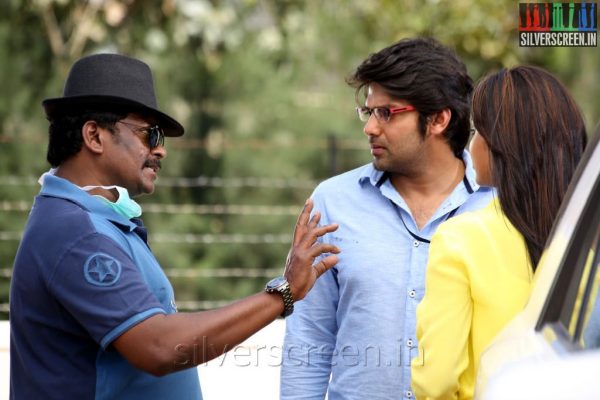
Actress Amala Paul, R Parthiepan and Arya in Kathai Thiraikathai Vasanam Iyakkam Movie Stills
The tagline of KTVI (A film without a story) has created a buzz; just as he had planned it. The movie is said to feature a lot of twists and turns; none of them predictable. He draws comparisons with Christopher Nolan’s Inception; but KTVI comes in four layers. “Romba azhagana ponnu enna love pannanum nu ninaikardhu oru challenge illaya? Athu mathiri, a script should challenge me. Only then, I can direct it.”
The next aphorism follows quickly, when I mention the slew of established actors who make special appearances in the film. “It was not easy to convince any of them,” he says, “nothing should come easy in life.
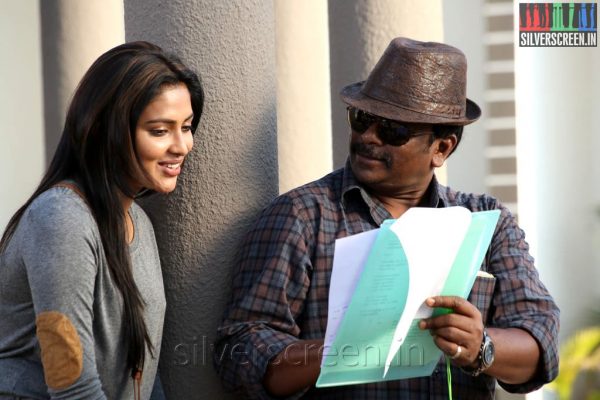
Actress Amala Paul and R Parthiepan in Kathai Thiraikathai Vasanam Iyakkam Movie Stills
He had a bound script to show the actors, he adds.
“Besides, I have earned those friendships, and the respect. They are confident that I will offer something new. Arya and Amala Paul have done extended cameos. So have Taapsee and Vishal. As a director, it gives me a high to help the actors discover new facets about themselves.” Parthiban has also chosen to not star in the movie himself, having roped in a fresh roster of talent. These novel aspects aside, KTVI also remains the only Tamil film to boast of five music directors.
It’s a compilation of many lives that he has witnessed.
Money has never seduced Parthiban. Try as it might. He declares this in a rare fit of passion. It has always been thanks to unadulterated love for cinema. “MGR was like that. He lived for cinema. So is Kamal Haasan.”
Naanum oru kutti Kamal maathiri.
The key to survival, he says, lies in re-inventing, and a hunger to explore new things. But despite the evolution of cinema, Parthiban despairs that producers, to a large extent, remain unchanged.
They still recoil from novelty.
Otherwise, this is the “golden era in the film industry”, the actor maintains; a time when films rule over stars, with a lot of young talent holding forth on some brand-new cinematic grammar.
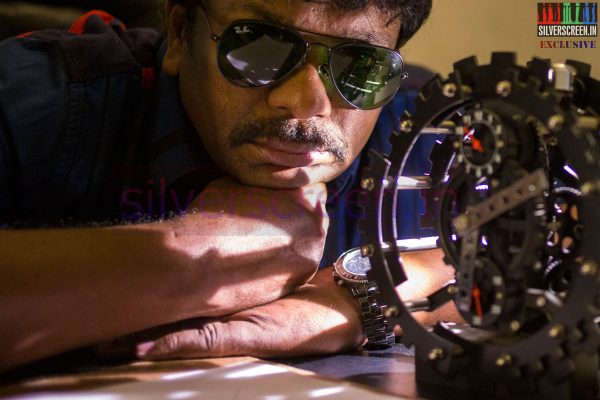
Actor Director R Parthiepan Exclusive HQ Photoshoot Stills for Silverscreen.in
Ellam nyabagamirukku.
That’s what made me who I am.”
Parthiban’s first salary was Rs 15. For a play. He used to do three shows a day. But the most distressing memory of all – his eyes fly open at the thought – would be selling rubber stamps for a living. In hindsight though, he declares that’s what helped him hone his now famous oratory skills. Films happened much later. An easy ticket to become a hero, he was told, was to become an assistant director first. And, he was diligent about the advice; watching films – a lot of them – for 5 paisa each at Rajeshwari Theatre. “That’s when I realized, to learn about movies, you can’t just restrict yourself to the good films. You also need to watch the bad ones.”
[quote align=’left’]MGR was like that. He lived for cinema. So is Kamal Haasan.” Naanum oru kutti Kamal maathiri.[/quote]The meeting with mentor K Bhagyaraj is another searing memory.
Cottage 105, Palm Grove Hotel.
He was the 98th man waiting there to narrate his story. He got the job, for a start-up of Rs 300. It was one of the toughest decisions that he had to make, but life began looking up then. He also profited as a dubbing artiste during that period – for actors like Shankar and Balachandran.
It was a learning curve from there. And being a non-smoker in a team of 11 assistants who were constantly on smoke-breaks had its merits. When the others used to take a break, he was left alone with “Bhagyaraj sir”. He would ask me, “yen, nee dhammadikka polaya? Perhaps he thought I was putting on an act. But that helped.”
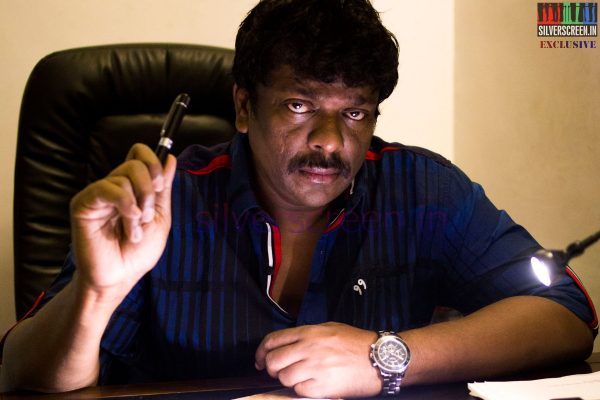
Actor Director R Parthiepan Exclusive HQ Photoshoot Stills for Silverscreen.in
Purinjitha naan solrathu?
He thinks hard for some time, and then, with a slow smile, with an air of someone savouring a favourite memory, continues, “Sir would discuss two lines for two days. He was such a perfectionist.”
What were his duties as an AD though, I ask curiously.
Pondaati mathiri thaan, he chuckles.
[quote align=’left’]Romba azhagana ponnu enna love pannanum nu ninaikardhu oru challenge illaya? Athu mathiri, a script should challenge me. Only then, I can direct it.[/quote]“With Bhagyaraj sir, the role was broader than what is usually expected of an AD. It went much beyond prompting lines for actors, more about helping with continuity of scenes.” And during that period, Bhagyaraj had joined politics, so he even had the task of preparing his speeches. That bond remains strong over the years; and just a call is all that is required for the actor to rush to his mentor’s side.
Pudhiya Paadhai (1989) was conceived after three years of inactivity; when a film that he had “almost directed” failed to take off. It was a testing period, Parthiban narrates slowly. Hurdles materialized at every point, and after listening to the first three scenes, no producer would touch it. None of the leading heroes were keen to play the ruffian either. So, he had to change the title. His original title, Kelvi Kuri, he was told, “lacked emotion”.
Nevertheless, he came across a kind soul: a producer who told him he would invest in the project only if he played the hero. But within three days of shooting, the movie was stalled. And when he kick-started the project again after six months, there were more obstacles. A scene required him to drag a woman by the hair and beat her. And some onlookers complained to the producer. But, he tells me,
Thappu senja, adikkarthukku aan pen vithyasam kedayadhu.
The movie was an instant hit after its release. “On the 13th, before the movie was released, I was in the streets. The next day, I was in a car.”
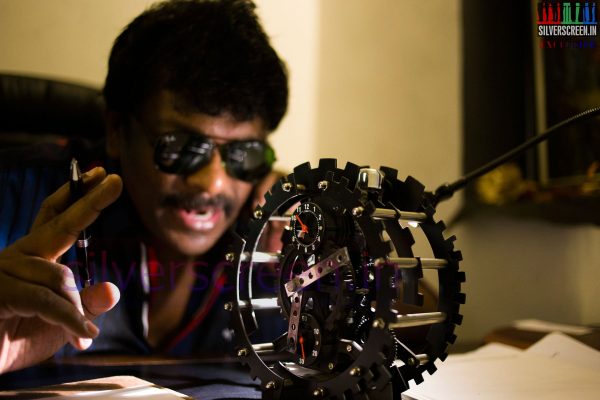
Actor Director R Parthiepan Exclusive HQ Photoshoot Stills for Silverscreen.in
“How can you feel a sense of pride in remaking someone’s films?”
[quote align=’left’]The movie was an instant hit after its release. “On the 13th, before the movie was released, I was in the streets. The next day, I was in a car.[/quote]Ten years post his debut, Parthiban worked on the experimental Houseful. Inspired by the Coimbatore bomb blasts, it is a 120-minute narrative that occurs between a matinee show. It won him a National Award. The question about faith and creed during the time of death is something that has been troubling him for a long time, and all that he wanted to convey was “life is more precious than everything”.
Neenga ennala Tamizh nalla kathukittenga la?
He suddenly interjects looking very pleased with himself.
Neenga varumbodhu romba stiffa irunthen. Ippo relax ayiten. I am able to talk more freely.
Athukaaga thaan naan nera paakanumnu insist pannen.”
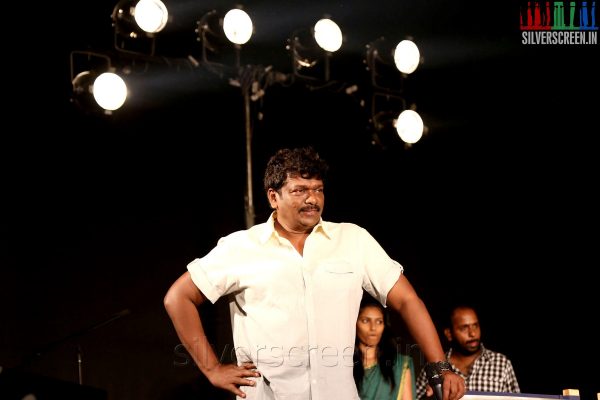
Actor Director R Parthiepan at the Kathai Thiraikathai Vasanam Iyakkam Audio Launch
Ennoda jaathagamey unga kitta irukkey, he smiles.
Nayakan (1987) though, was a reality check. “I used to think I was a brilliant actor and wondered why nobody approached me for films. Romba kovam irundhudu. But that movie made me realise I need to wait for a few years more. That is how cinema should be made.”
Parthiban is also quite clear about something else. Good cinema makes the audience think. “Padam paathu thirumbi varumbodhu, manasula konjam heaviness irukkanum. It should disturb me. Force me to think.” He backs up with another aphorism.
Mudhal Mudhala love vandha maathiri. You don’t know the feeling yet, but you keep wanting to see her.
He laughs heartily at this.
Direction is tougher, he says. Acting, relatively easy.
Nadikkarathu janangalukku pudicha mattum porum. Ana, direction apdi kedayadhu.
“As a director, we have to prove to the audience every time. Bring something new and interesting.”
[quote align=’left’]I wanted to marry him myself, but Ramya Krishnan got there first. I love him that much[/quote]But he’s open to suggestions as well; from his actors, technicians and Ads. If they have something better to offer, he accepts it. “Sometimes, my ADs come up with brilliant suggestions. I accept them, but at the end of the day, credits will roll only for the director.” He’s quite matter-of-fact about it.
The current crop of actors, Parthiban observes, are talented but undisciplined. “Even my son for that matter. Then, there are actors like Suriya, who are more methodical on the sets. At the end of the day though, talent is what that matters.” His eyes light up when I steer the conversation towards his children. “Such a vast difference in our thought processes. Naa endha vishayatha romba tension aayi pannirukkeno, avanga adhe vishayatha romba cool aa pannuvanga.”
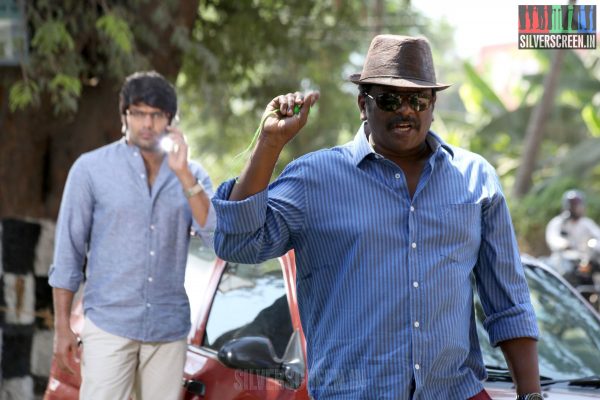
Kathai Thiraikathai Vasanam Iyakkam Working Stills with R Parthiepan, Amala Paul, Arya
His phone suddenly rings, and with an apologetic glance at me, he answers.
And lapses effortlessly into fluent Telugu.
“Now,” he grins mischievously, after hanging up, “that was Telugu.”
He then singles out Telugu director Krishnavamsi with whom he worked on a movie (Ananthapuram, 1989) as his favourite director. “I wanted to marry him myself, but Ramya Krishnan got there first. I love him that much,” he chortles. “When you get to watch such talent at close quarters, there’s an undeniable attraction.” That’s why, he says, many heroines fall in love with directors and get married to them.
Parthiban also quite likes Selvaraghavan. His thoughts are abstract, he says. “What astonished me was, before AO, I worked in close to 50 films, yet he was able to bring out a different side of me. He used to act out the scenes and had no qualms about taking three days for a perfect shot.” He also sees a lot of himself in Dhanush.
“Aarambathilla, naan panna maathiriye…there’s fire in his eyes.”
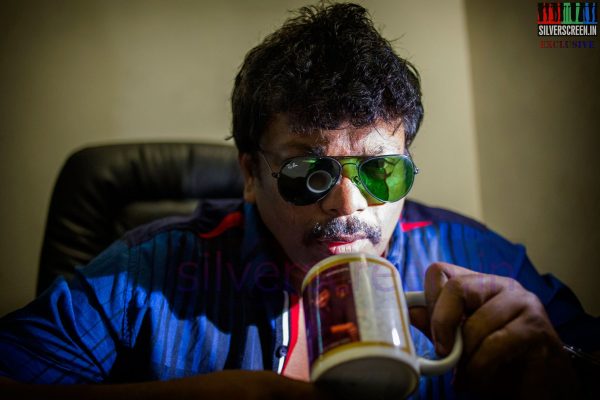
Actor Director R Parthiepan Exclusive HQ Photoshoot Stills for Silverscreen.in
Parthiban likes Jaggi Vasudev and Osho, and he has made sure that he has passed that on to his children as well.
Saami kovil kulla maatum irukkaathu nu nenaikara manithan naan.
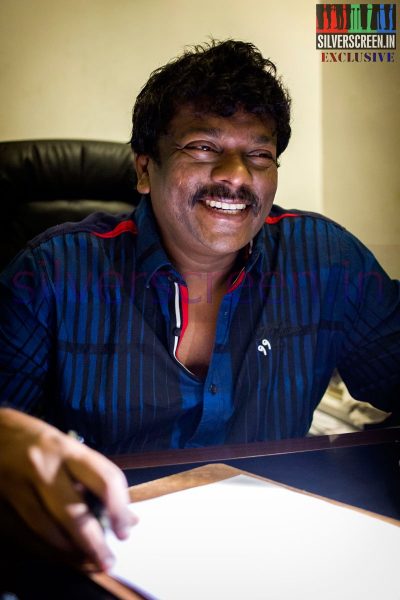
Actor Director R Parthiepan Exclusive HQ Photoshoot Stills for Silverscreen.in
Parthiban calls himself an “ordinary father”, whose eyes welled up when Mani Ratnam told him that his daughter was a natural. Someone who can give four variations for every scene in Kannathil Muthamittal.
And when she bagged the National Award, “I heard a clap from within my soul.”
Ippo naan ennoda positives mattum sollitu iruken. But I know my negatives, and I am slowly trying to erase them. That is honesty, he declares.
He also writes lot of poems about love. There is a book on the agenda, as well. Right now, though, he is quite focused on his latest film. “Failures are not new to me. But I really want this movie to do well. There is a lot of money involved in it.” His dreams are boundless. Make films, and take them to the Oscars one day.
Presently, his Man Friday knocks. Director Venkat Prabhu’s assistant is here, would he like to meet him? “Tea kuduthu konjam ukkara veinga. Innoru 10 minutes illaya?” I nod. “I am acting in Masss. Suriya is the hero. His films are simple and beautifully told. I am excited.”
Recommended
As we are winding down the interview, he tells me that he has done many films for money as an actor. But never as a director. “I had always thought of myself as a director. And sometimes, the director confuses the actor in me,” he observes, “I can never be aloof, I love interacting with people. It helps me learn. Director a irundhu pazhakkamayiruchu.”
Actors are blessed though, he says. They don’t have to retire. But Parthiban has found a getaway all the same; a place he frequents when he’s not working. Allepey, near the backwaters in Kerala is a favourite haunt. “Like Bharathiyaar, I love Kerala as well. And I always make sure I drink tea from the tea-kadai nearby. Life will then be adipoli,” he laughs, before declaring somberly, “ithu nejama solren. Ippo Andhra lerndhu innoru journalist vandha, I won’t say I like Hyderabad.”
The (R Parthiepan aka) R Parthiban interview is a Silverscreen Exclusive.

